Discover the Serenity of Jizu Mountain: A Hidden Buddhist Gem
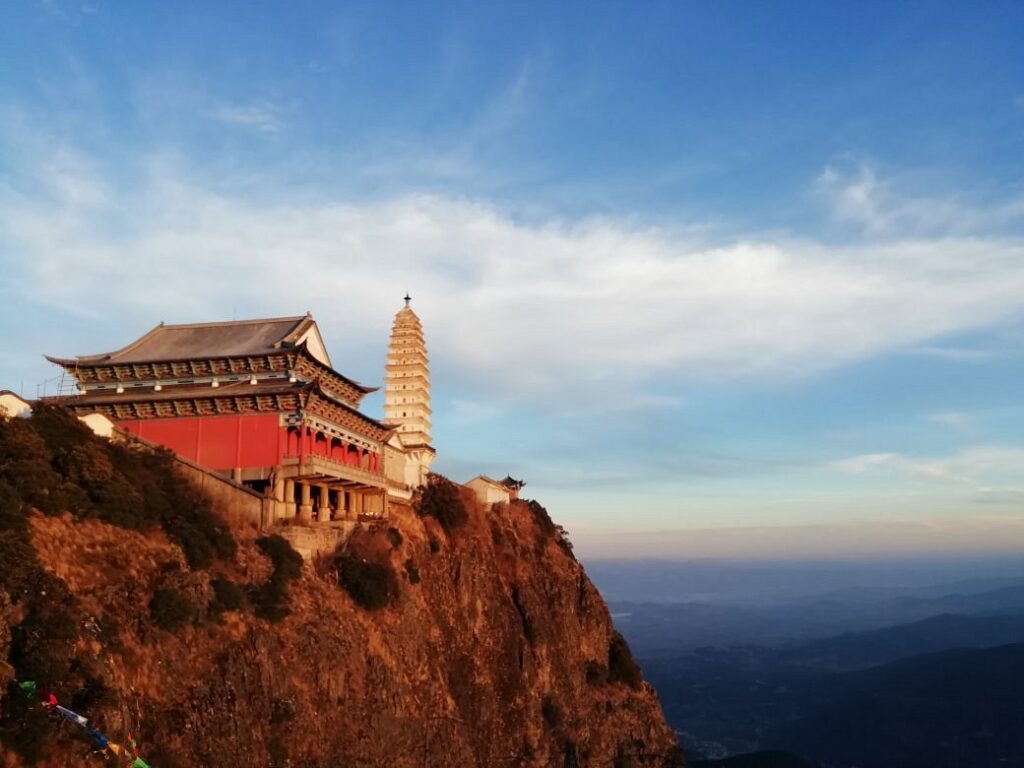
An Essential Guide to Visiting Jizu Mountain Buddhist Site
Nestled in the serene embrace of Yunnan Province, Jizu Mountain, or Chicken Foot Mountain, beckons travelers with the promise of tranquility and spiritual discovery. Just a stone’s throw from the bustling city of Dali, this hidden gem offers an escape from the throngs of tourists flocking to more well-trodden paths. As you ascend its rugged trails, each step reveals the rich tapestry of Buddhist culture woven into the landscape.
The site is home to the iconic Hanging Temple, a breathtaking architectural marvel that clings precariously to the cliffs, offering stunning views and a profound sense of peace. Here, the air is filled with the gentle whispers of nature, punctuated only by the soft chants of monks tending to their gardens. Visitors can immerse themselves in the local culture while exploring ancient temples, each echoing stories of devotion and resilience.
Jizu Mountain invites you to leave behind the commercialized chaos and step into a world where spirituality reigns supreme. Whether you are a seasoned hiker or a curious traveler in search of a unique experience, this sacred site promises to touch your soul and inspire awe. Prepare for an unforgettable journey as you delve into the heart of Jizu Mountain’s mystical charm.
In This Guide
- An Essential Guide to Visiting Jizu Mountain Buddhist Site
- The Rich History and Legends of Jizu Mountain Buddhist Site
- Main Highlights: What You Absolutely Can’t Miss
- Planning Your Visit: A Practical Guide
- Tickets: Prices, Booking, and Tips
- How to Get There: A Complete Transportation Guide
- Local Cuisine and Accommodation Nearby
- Frequently Asked Questions
- Final Thoughts on Your Trip
The Rich History and Legends of Jizu Mountain Buddhist Site
Nestled in the lush, mountainous landscapes of Yunnan province, Jizu Mountain (鸡足山) stands as a serene sanctuary, steeped in rich history and profound spiritual significance. This revered Buddhist site, often overshadowed by the more commercial attractions of Dali, offers travelers a unique glimpse into the region’s spiritual heritage and legends.
Jizu Mountain has been a pilgrimage destination for centuries, deeply rooted in Chinese Buddhist traditions. Historical records trace its significance back to the Tang Dynasty (618-907 AD), when it was first recognized as a sacred site. The mountain is renowned for its stunning vistas and the sense of tranquility it exudes, which draws both local worshippers and international visitors seeking solace and enlightenment.
At the heart of Jizu Mountain lies the Guanyin Chan Temple (观音禅寺), a testament to the enduring legacy of Buddhist architecture and art. Originally constructed in 1529 during the Ming Dynasty, the temple has undergone several restorations, reflecting the resilience of both the structure and the faith it embodies. Each layer of renovation tells a story, from the artistic flourishes of the Ming era to the repairs made after the Cultural Revolution. The temple serves not just as a place of worship but as a living museum, showcasing intricate carvings, mythical creatures known as chiwen (鸱吻), and the vibrant colors of ancient murals that narrate tales of Buddhist teachings.
The legends surrounding Jizu Mountain are as captivating as its history. One of the most prominent stories involves the mountain’s name itself, which translates to “Chicken Foot Mountain.” According to local folklore, the mountain resembles a chicken’s foot, symbolizing protection and prosperity. It is also said that the mountain houses the spirit of the Buddha, making it a sacred place for devotees who seek his blessings.
Pilgrims often recount experiences of spiritual awakening on the mountain, where the crisp air and majestic surroundings foster a deep connection to nature and the divine. The trails leading to the Hanging Temple (观音箐悬空寺), a remarkable structure perched precariously on the cliffs, further enhance the mystical ambiance of the site. The temple’s precarious location is believed to represent the balance between the physical and spiritual realms, inviting visitors to contemplate their own journeys.
In addition to its spiritual allure, Jizu Mountain is home to a vibrant community of monks who maintain the temple and its gardens, exemplifying a lifestyle of simplicity and devotion. These monks often share their insights with visitors, providing a deeper understanding of the site’s history and the teachings of Buddhism. Their presence adds a layer of authenticity, allowing travelers to engage with the living traditions of this sacred space.
As you wander through the lush pathways of Jizu Mountain, each step resonates with the echoes of prayers and the whispers of ancient legends. It is a place where the past and present intertwine, offering an escape from the hustle and bustle of modern life and an opportunity to reflect on the enduring power of faith and history. Whether you are a seasoned pilgrim or a curious traveler, Jizu Mountain promises a journey that transcends the physical, inviting you to explore the depths of spirituality and the rich tapestry of culture that defines this remarkable Buddhist site.
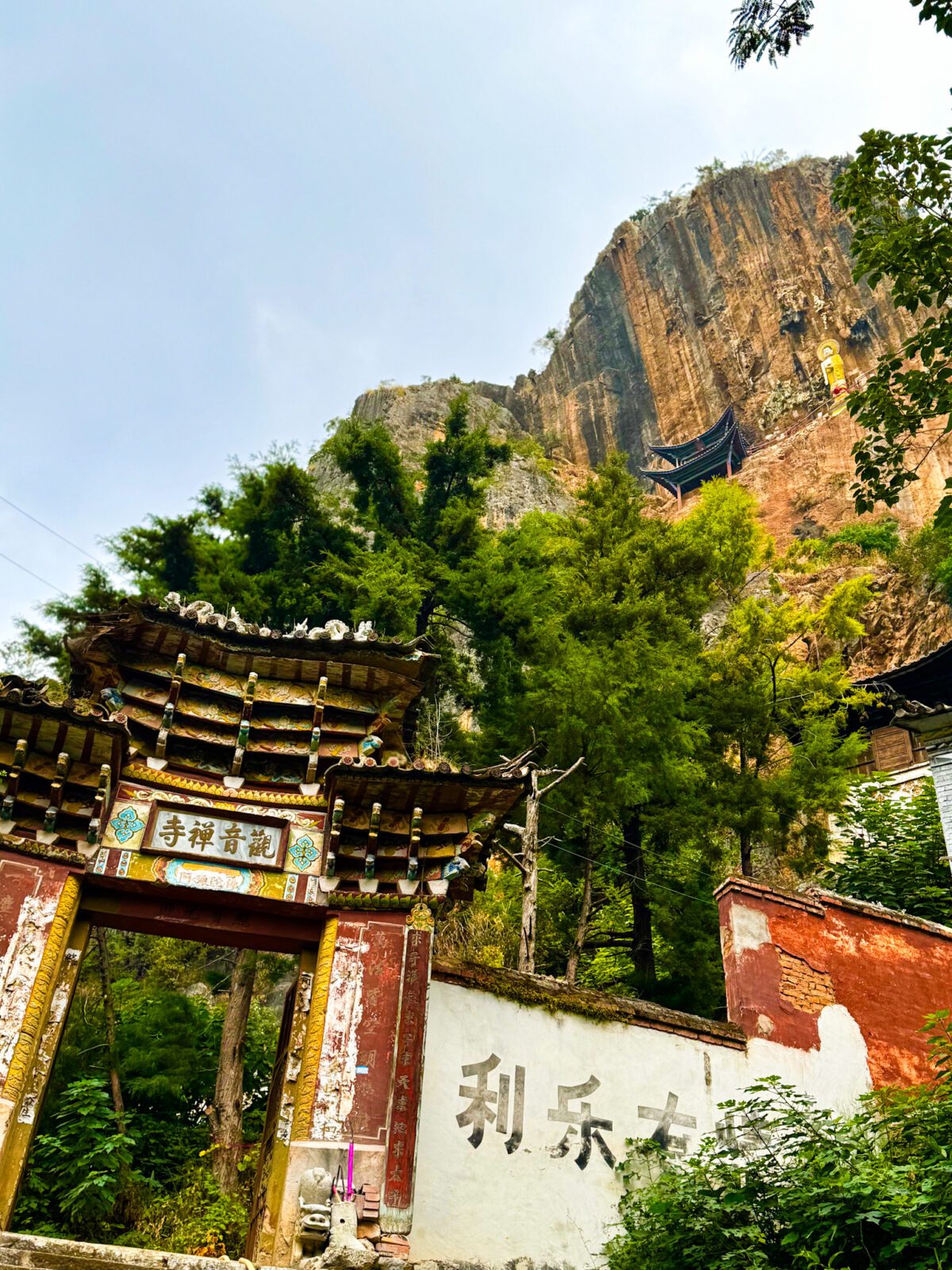
Jizu Mountain Buddhist Site.
Main Highlights: What You Absolutely Can’t Miss
Nestled in the serene landscapes of Yunnan Province, Jizu Mountain Buddhist Site is a hidden gem that offers an enriching experience for those seeking tranquility and spiritual discovery. Here are the key highlights that you absolutely cannot miss during your visit:
1. The Enigmatic Hanging Temple
The Hanging Temple (观音箐悬空寺) is a must-see marvel perched precariously on the cliffs of Jizu Mountain. This architectural wonder, built into the rock face, showcases ancient craftsmanship and provides stunning views of the surrounding mountains and valleys. As you ascend the winding paths to reach the temple, take a moment to admire the intricate carvings and vibrant colors adorning its structures. The peaceful atmosphere here is perfect for reflection and appreciation of the Buddhist traditions that have thrived at this site for centuries.
2. Cixiao Temple: A Gateway to Peace
Your journey begins at Cixiao Temple (慈孝寺), which serves as the entrance to the trails leading up to the Hanging Temple. This temple is less frequented by tourists, making it an ideal starting point for a peaceful hike. The grand entrance, adorned with a massive statue of Confucius (孔子), sets the tone for a cultural and spiritual experience. Stroll through the beautifully maintained gardens and take in the serene ambiance before embarking on your ascent.
3. Breathtaking Views Along the Hiking Trails
The hike up Jizu Mountain is an experience in itself. As you navigate the stone steps leading to the Hanging Temple, you will be treated to panoramic views of the lush landscape below. The ascent can be invigorating, with fresh mountain air and the sound of rustling leaves accompanying your journey. Make sure to pause at various viewpoints to capture the breathtaking scenery and reflect on the spiritual significance of this sacred mountain.
4. Guanyin Chan Temple: Rich in History
As you continue your hike, you will encounter the Guanyin Chan Temple (观音禅寺). This temple, rich in history and culture, dates back to the Ming Dynasty and has witnessed numerous renovations over the centuries. Explore its intricately designed structures, which feature colorful dragon motifs and mythical creatures. Engage with the resident monks who are happy to share stories of the temple’s past and their daily lives, enhancing your understanding of the local culture.
5. The Monastic Life
One of the most enriching experiences at Jizu Mountain is the opportunity to interact with local monks. At Guanyin Chan Temple, you may find monks tending to the gardens or preparing tea for visitors. They often share insights into their monastic life and the spiritual practices that guide them. This connection offers a unique perspective on the significance of the mountain as a place of worship and reflection.
6. The Golden Dragon Statue
As you make your way towards the Hanging Temple, don’t miss the golden dragon statue overlooking the area. This stunning piece of art is both a symbol of protection and a beautiful backdrop for photographs. The intricate details of the statue reflect the rich cultural heritage of the region and serve as a reminder of the artistic craftsmanship that characterizes many of the site’s structures.
7. Peaceful Retreats and Scenic Rest Areas
Throughout your hike, you’ll find several rest areas and small shrines nestled among the trees. These spots provide perfect opportunities to pause, recharge, and soak in the natural beauty surrounding you. Whether you’re enjoying a moment of quiet reflection or taking in the views, these peaceful retreats enhance your overall experience of the mountain.
8. Unique Flora and Fauna
The biodiversity of Jizu Mountain adds another layer of wonder to your visit. Keep an eye out for the unique plant species and wildlife that inhabit the area. The region’s lush vegetation and serene environment create a perfect habitat for various animals, making this not only a spiritual journey but also a chance to connect with nature.
Visiting Jizu Mountain Buddhist Site is more than just a trip; it’s an opportunity to immerse yourself in the rich tapestry of Chinese culture, spirituality, and natural beauty. Be sure to take your time, soak in the views, and appreciate the tranquility that this remarkable site has to offer.
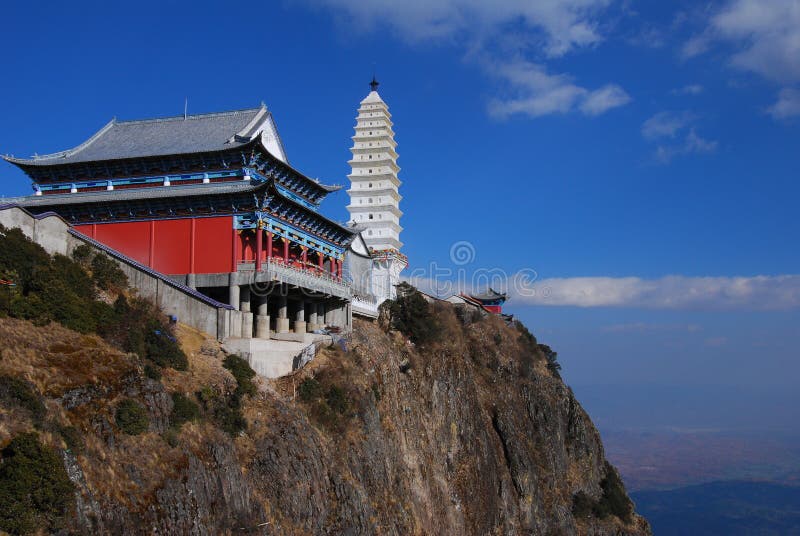
Jizu Mountain Buddhist Site.
Planning Your Visit: A Practical Guide
Planning Your Visit to Jizu Mountain Buddhist Site
Nestled in the serene landscapes of Dali, Yunnan, the Jizu Mountain Buddhist Site offers an enchanting escape from the more commercialized attractions of the region. This practical guide will provide you with essential tips and insights to make the most of your visit to this hidden gem.
Getting There
Location: Jizu Mountain is located about an hour’s drive east of Dali, which is approximately two hours northwest of Kunming, the capital of Yunnan Province.
Transportation:
– By Taxi or Didi: The most convenient way to reach Jizu Mountain is by booking a Didi (the Chinese equivalent of Uber) from Dali. This will allow you to travel at your own pace and have flexibility during your visit.
– Public Transportation: Buses from Dali to the nearby city of Chuxiong can also be an option, but you may need to arrange local transport to the mountain from there.
Best Time to Visit
Season: The ideal time to visit Jizu Mountain is during the spring (March to May) or autumn (September to November) when the weather is mild, and the views are clear.
Avoiding Crowds: To experience the tranquility of the site, visit on weekdays rather than weekends or during Chinese public holidays when tourist numbers can swell.
Entrance and Fees
Admission: There is no entrance fee to access Jizu Mountain or its associated temples, making it an affordable destination for travelers.
What to Expect
Hiking Trails: The main attraction is the hike that leads to the Hanging Temple and other temples scattered around the mountain. The trails are well-marked but can be steep and challenging in places. Expect multiple flights of stairs, and be prepared for a workout!
Scenic Views: Along the hike, you will be surrounded by stunning natural beauty and cultural landmarks. Keep your camera handy for breathtaking views of the temples and the surrounding landscapes.
Cultural Experience: Engage with the local monks and learn about the rich history of the temples. Many monks are welcoming and willing to share stories about their lives and the significance of the site.
Essential Tips
- Wear Comfortable Footwear: The trails can be uneven and slippery, especially if it has recently rained. A good pair of hiking shoes is highly recommended.
- Bring Water and Snacks: There are limited facilities along the trails, so pack enough water and some snacks to keep your energy up during the hike.
- Respect Local Customs: As a religious site, be mindful of your behavior. Dress modestly, speak softly, and treat the temples and monks with respect.
- Stay Hydrated: The elevation can be high (nearly 2000 meters), so take breaks as needed to acclimatize and enjoy the scenery.
Nearby Attractions
After visiting Jizu Mountain, consider exploring other attractions in the Dali area:
– Dali Old Town: Experience the unique Bai minority culture, local shops, and restaurants.
– Erhai Lake: Enjoy the scenic beauty and perhaps take a boat ride on the lake.
– Three Pagodas of Dali: A historical site that offers insight into the region’s architectural styles and history.
Conclusion
Jizu Mountain Buddhist Site is a captivating destination that offers both spiritual enrichment and physical adventure. With its stunning views, rich history, and peaceful atmosphere, it’s an ideal spot for travelers seeking a break from the bustling tourist hotspots. Plan your visit thoughtfully, and you’ll leave with unforgettable memories and a deeper understanding of Yunnan’s cultural heritage.
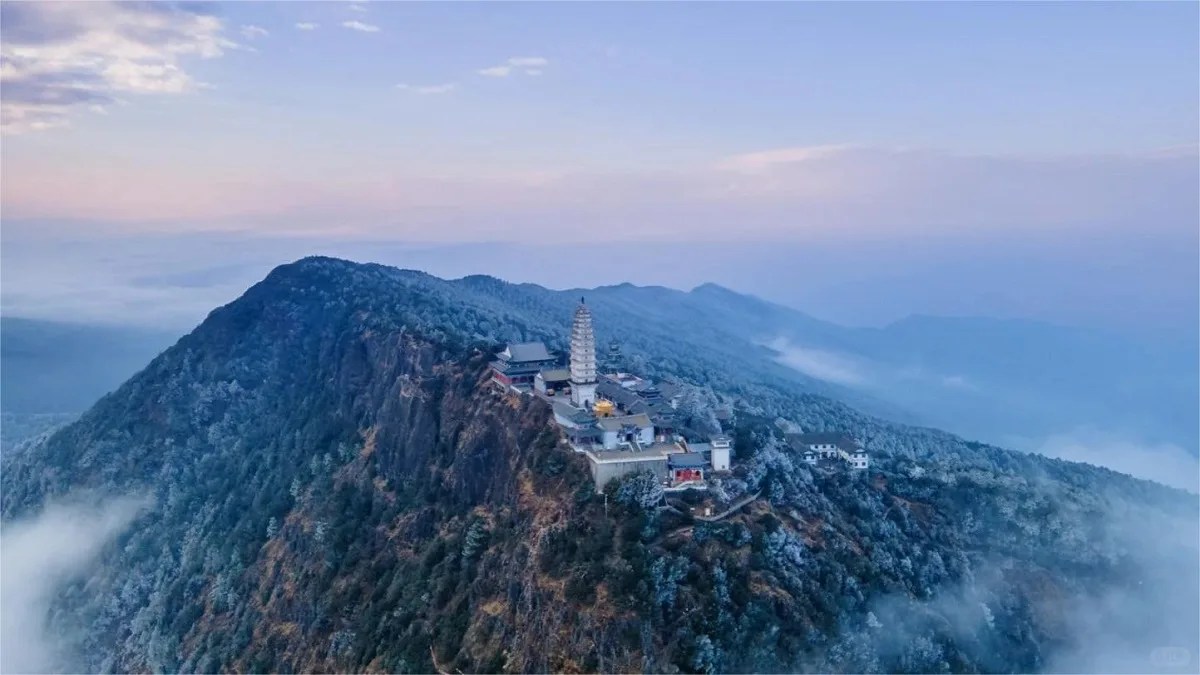
Jizu Mountain Buddhist Site.
Tickets: Prices, Booking, and Tips
When planning your visit to the Jizu Mountain Buddhist Site, it’s essential to know the ticketing details to ensure a smooth entry. Fortunately, the good news for international travelers is that access to this serene and historically rich site is quite affordable and straightforward.
Ticket Information
- Entrance Fee: Currently, there is no entrance fee to access the Jizu Mountain Buddhist Site. This makes it an excellent option for those looking to experience the cultural and spiritual significance of the area without the burden of additional costs.
Booking Tips
- Transportation: Given the site’s remote location, it’s advisable to arrange your transportation in advance. You can use ride-hailing apps like Didi, which are widely used in China, to get to the entrance of Cixiao Temple, the starting point for your hike to the Hanging Temple.
- Guided Tours: If you’re unfamiliar with the area or prefer a more structured experience, consider booking a guided tour. Local guides can provide valuable insights into the history and significance of the temples.
- Best Time to Visit: To avoid crowds and enjoy the tranquility of the mountain, aim to visit during weekdays or early in the morning. The site tends to be less busy during these times, allowing for a more peaceful exploration of the temples.
Additional Tips
- Prepare for Hiking: Wear comfortable hiking shoes, as the trails can be steep and uneven. It’s also advisable to bring water and snacks, especially if you plan to spend an extended period exploring the area.
- Weather Considerations: Check the weather forecast before your visit. While the mountain air can be refreshing, sudden rains can make the trails slippery. A lightweight rain jacket can be handy.
- Respect Local Customs: As a site of spiritual significance, it’s important to respect the local customs and practices. This includes being quiet while in the vicinity of the temples and refraining from taking photos in restricted areas.
By keeping these tips in mind, you can make the most of your visit to the Jizu Mountain Buddhist Site, immersing yourself in its serene atmosphere and rich history. Enjoy your journey into this hidden gem of Yunnan!
How to Get There: A Complete Transportation Guide
Reaching the Jizu Mountain Buddhist Site, also known as the Hanging Temple, is an adventure that begins in the charming city of Dali, Yunnan. This hidden gem offers a peaceful retreat from the bustling tourist spots and is an ideal destination for those looking to immerse themselves in local culture and breathtaking natural scenery. Here’s a comprehensive guide to help you navigate your journey to this serene site.
Getting to Dali
Before you can embark on your excursion to Jizu Mountain, you’ll need to arrive in Dali. The city is easily accessible by various forms of transportation:
-
By Air: Dali Airport (DLU) is the nearest airport, located about 30 kilometers from the city center. Several domestic flights connect Dali to major cities like Kunming, Guangzhou, and Beijing. Once you arrive, you can take a taxi, airport shuttle, or rideshare service like Didi to your hotel.
-
By Train: Dali is connected to several major cities through the high-speed rail network. The Dali Railway Station is approximately 13 kilometers from the city center. You can take a taxi or a local bus to reach your accommodation.
-
By Bus: Several long-distance buses operate from nearby cities like Kunming and Lijiang. The Dali Bus Station is centrally located, making it easy to find transportation once you arrive.
From Dali to Jizu Mountain
Once you have settled in Dali, the next step is to make your way to the Jizu Mountain Buddhist Site. Here are the primary options for getting there:
-
Private Car or Taxi: The most convenient option is to hire a taxi or a private car. The journey takes about an hour and covers roughly 50 kilometers. You can easily arrange for a driver through your hotel or use a rideshare app like Didi. It’s advisable to confirm the fare in advance for a smooth experience.
-
Public Bus: For the more budget-conscious traveler, public buses are available from Dali to the nearby town of Chuxiong, with connections to Jizu Mountain. Buses typically depart from the Dali Bus Station, and the trip to Jizu takes about 1.5 to 2 hours. Upon arriving at Chuxiong, you can catch a local minivan or taxi to the mountain.
-
Group Tours: If you prefer a guided experience, consider joining a local tour group. Many tour operators in Dali offer packages that include transportation, a guide, and sometimes meals. This can be a hassle-free way to explore the area and learn more about its history and significance.
Exploring Jizu Mountain and the Hanging Temple
Upon arrival, prepare for a bit of a hike. The path to the Hanging Temple is well-marked, and while it offers stunning views, be sure to wear comfortable shoes and bring water for the journey. The hike can take anywhere from 30 minutes to an hour, depending on your pace and the number of stops you make to soak in the scenery.
Returning to Dali
After your visit, returning to Dali is just as straightforward. If you arrived by taxi or private car, your driver can take you back. If you opted for public transportation, simply follow the same route in reverse—catch a minivan from Jizu Mountain to Chuxiong, then a bus back to Dali.
Final Tips
-
Timing: Consider visiting during weekdays or early mornings to avoid crowds, especially during peak tourist seasons.
-
Weather Preparedness: Jizu Mountain can experience sudden weather changes, so pack layers and a light raincoat.
-
Cash and WeChat Pay: While larger establishments may accept credit cards, smaller vendors might only take cash or WeChat Pay, so it’s wise to have some local currency on hand.
With this guide in hand, your journey to the tranquil Jizu Mountain Buddhist Site will be both enjoyable and memorable. Prepare to be captivated by the stunning mountain views and the rich cultural heritage that awaits you. Safe travels!
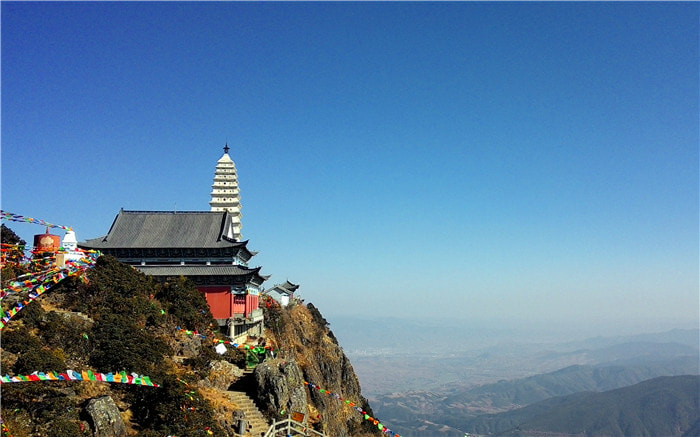
Jizu Mountain Buddhist Site.
Local Cuisine and Accommodation Nearby
When visiting the serene Jizu Mountain Buddhist Site, you’ll want to indulge in the local cuisine and find comfortable accommodation nearby to enhance your experience. Here are some delightful dining options and cozy places to stay that capture the essence of this tranquil region.
Dining Options
1. Jizu Mountain Restaurant (鸡足山餐厅)
Located at the foot of Jizu Mountain, this restaurant offers a menu rich in local flavors, featuring traditional Yunnan dishes. Try the Crossing-the-Bridge Noodles (过桥米线), a regional specialty, and don’t miss out on the earthy flavors of their Yunnan Wild Mushroom dishes. The restaurant’s serene ambiance makes it a perfect stop after a hike.
2. Bai Cuisine Eatery (白族风味餐厅)
Just a short drive from the mountain, this family-run eatery serves authentic Bai cuisine, known for its fresh, locally sourced ingredients. The Bai-style Roast Duck and Steamed Fish with Ginger are must-tries. The friendly staff adds to the welcoming atmosphere, making it a great place to relax and refuel.
3. Chuxiong Local Market (楚雄地方市场)
For a more casual dining experience, visit the Chuxiong Local Market, where you can sample a variety of street foods. From grilled skewers to spicy rice cakes, the market is a food lover’s paradise. Make sure to sip on some Yunnan Pu’er tea, known for its rich flavor and health benefits.
Accommodations
1. Jizu Mountain Eco-Lodge (鸡足山生态旅馆)
Nestled near the base of the mountain, this eco-lodge offers a unique blend of comfort and sustainability. With stunning views of the surrounding landscape, the lodge features cozy rooms designed with traditional decor. Enjoy a complimentary breakfast featuring local ingredients to start your day on the right foot.
2. Dali Heritage Inn (大理遗产客栈)
Located in the heart of Dali, this charming inn is an excellent base for exploring Jizu Mountain. Decorated in a traditional Bai style, the inn provides comfortable rooms and a lovely garden space to relax. Guests rave about the hospitality and the homemade breakfast served each morning.
3. Guanyin Chan Temple Guesthouse (观音禅寺客栈)
For a more immersive experience, consider staying at the guesthouse near Guanyin Chan Temple. This unique accommodation offers simple rooms with monk-like minimalism, allowing you to connect with the tranquil atmosphere of the area. Enjoy a peaceful retreat and partake in the daily rituals of the temple.
Experience the Local Flavor
Whether you’re savoring the distinct flavors of Yunnan cuisine or enjoying the comfort of local accommodations, your visit to Jizu Mountain will be enhanced by these delightful options. Immerse yourself in the rich culture and traditions that this beautiful region has to offer, making your journey truly memorable.
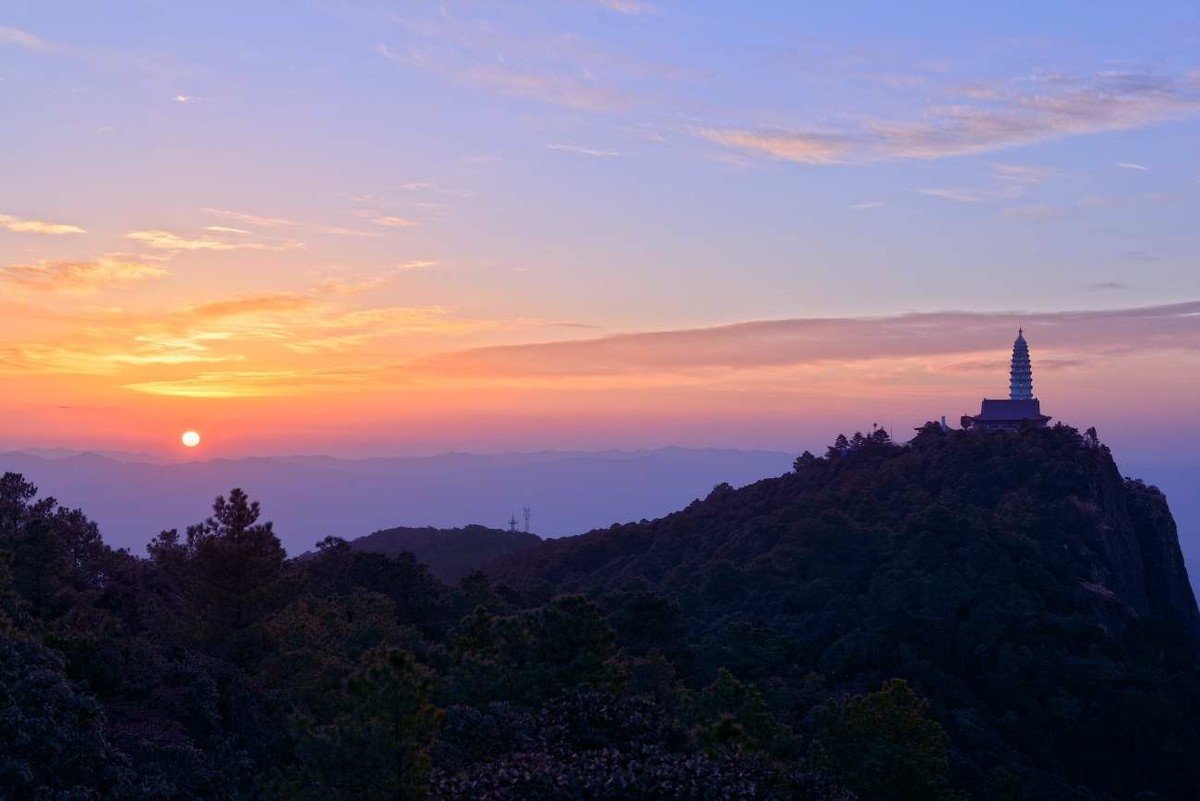
Jizu Mountain Buddhist Site.
Frequently Asked Questions
-
How do I get to Jizu Mountain from Dali?
To reach Jizu Mountain from Dali, you can opt for a Didi (a local ride-hailing service) or take a taxi. The journey takes about an hour, and you’ll enjoy scenic views along the way. Ensure you confirm your return trip with the driver, as this area is less frequented by tourists. -
Is there an entrance fee for the Hanging Temple?
No, there is no entrance fee to visit the Hanging Temple or the surrounding Cixiao Temple area. This makes it an excellent option for budget-conscious travelers looking to explore unique cultural sites. -
What should I wear for the hike?
Comfortable hiking shoes are essential, as the trails can be steep and uneven. Dress in layers, as the mountain weather can change quickly. A light jacket or long sleeves are advisable due to cooler mountain temperatures, especially at higher elevations. -
Are there facilities available at Jizu Mountain?
There are limited facilities on the mountain itself. While you may find rest areas along the hiking path, it’s wise to bring your own water, snacks, and any essentials you might need during your visit, as options may be scarce. -
What is the best time to visit Jizu Mountain?
The best time to visit is during the spring (March to May) and autumn (September to November) when the weather is mild and the scenery is particularly beautiful. Avoid peak summer months, as temperatures can be quite high, making hiking less enjoyable. -
Can I get lost on the hiking trails?
While the main paths are generally well-marked, it’s possible to lose your way if you venture off the established trails. It’s advisable to stick to the main paths and consider downloading a map on your phone before your hike for guidance. -
Are there any guided tours available?
Yes, several local tour operators offer guided hikes to Jizu Mountain and the Hanging Temple. A guide can enrich your experience with historical context and local lore, making it a worthwhile investment for first-time visitors. -
What should I do if I encounter a monk or local residents?
It’s always nice to greet the monks and locals with a smile and a simple “Ni hao” (hello). Respect their space and customs, and if you wish to engage in conversation, be polite. Many monks are happy to share insights about their lives and the temple’s history if they have the time.
Final Thoughts on Your Trip
As you conclude your journey to Jizu Mountain, take a moment to reflect on the profound serenity and cultural richness that this hidden gem offers. Unlike the bustling tourist hotspots of Dali, the tranquil paths of Jizu Mountain lead you to a deeper understanding of the area’s spiritual heritage. Here, amidst the towering cliffs and whispering winds, you’ll find not just the majestic Hanging Temple and the serene Guanyin Chan Temple, but also the heartfelt stories of the monks who dedicate their lives to nurturing peace in this sacred space.
Each step you take on the winding trails reveals breathtaking vistas and intimate encounters with the local flora and fauna, reminding you that adventure often lies off the beaten path. Embrace the stillness and allow the gentle rhythm of nature to rejuvenate your spirit. Whether you’ve come for spiritual reflection, a love of hiking, or simply to escape the noise of modern life, Jizu Mountain invites you to immerse yourself in its beauty and tranquility.
As you depart, carry with you the memories of this serene retreat, where ancient traditions and breathtaking landscapes converge. Let the essence of Jizu Mountain inspire your journey forward, igniting a deeper appreciation for both the natural world and the rich tapestry of cultures that define our shared humanity.